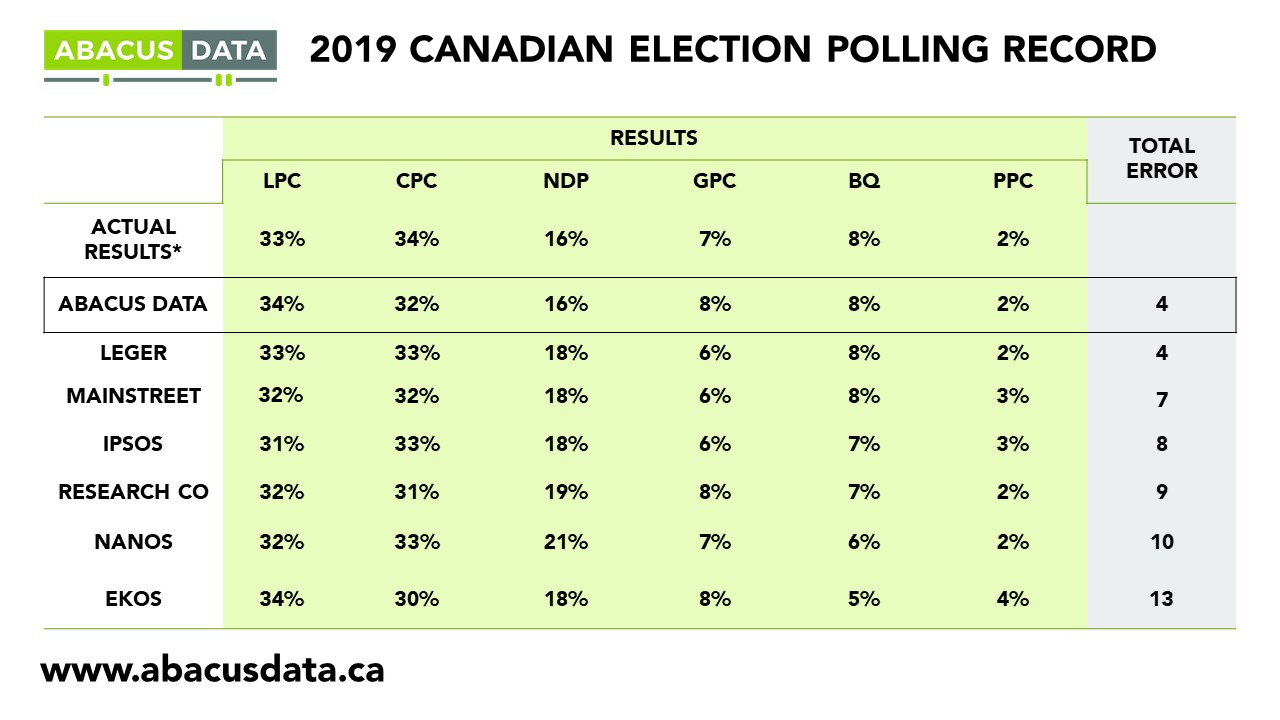How can Canada’s Conservative Party grow support? A gap analysis
March 18, 2021
Listen to David Coletto’s new podcast inFocus with David Coletto
With the Conservative Party’s policy convention starting today, I took a quick look at some of our recent surveys to understand the opportunities and risks for the party heading into a likely federal election. For all of 2020 and 2021, the party’s vote share has hovered in a narrow band between 29% to 32%.

In our most recent survey (more details out tomorrow), 23% of all respondents would vote Conservative – half the number who say they are open to voting Conservative (46%).
In this analysis, I focus on the 23% who say they are open to voting Conservative but are either supporting another party now or say they are undecided. I compare them to current Conservative Party supporters throughout.

Here are five key findings:
1- Potential Conservative voters are much younger than current supporters. 57% of potentials are under 45 compared with only 31% of current supporters.
Implication: The party needs to find a way to appeal to younger voters. Fights over abortion and a perception the party doesn’t care about climate change won’t help. In fact, in our most recent survey, the Conservatives are polling 4th, behind the Greens among those under 30 and have been trending down for three straight months.

2- Potential Conservative voters are far more diverse than current supporters. Currently, 14% of Conservative supporters self-identify as a member of a racialized group. Among potential supporters, 29% are from a racialized group.
Implication: Under Stephen Harper’s leadership the party was able to appeal to some racialized Canadians. It needs to figure out how to do it again, especially since Canada’s population will continue to become more diverse over time and the key ridings around Toronto and Vancouver are the most diverse in the country.

3- Anti-immigrant sentiment is higher among current supporters, but far fewer potential Conservative voters feel the same way. While 42% of Conservative voters think that immigrants are a burden on the country, only 29% of potential Conservatives feel the same way.
Implication: The party cannot be seen as anti-immigrant. Being inclusive and open to diversity is key to grow but there are some in the base who want to see fewer immigrants admitted to Canada.

4- Climate change presents the greatest challenge for the Conservatives to grow. Only 1 in 3 Conservative supporters think climate change is a crisis compared with more than half among potential supporters. 18% of Conservative supporters think climate change is a hoax, more than 4 times the number among potential supporters.
Implication: Conservatives need to be seen as serious about climate change. Past research we’ve done showed that few thought Andrew Scheer took the issue seriously. Erin O’Toole can’t fall into the same trap. The problem is much of his base doesn’t put climate change anywhere near the top of its priorities.

5- Potential Conservative supporters don’t dislike Mr. Trudeau as nearly as much as Conservative supporters do. While only 14% of potential Conservatives have a very negative view of Mr. Trudeau, 49% of current supporters do.
Implication: Dislike for Mr. Trudeau was an effective motivator for Conservatives in 2019. Turnout spiked in many Conservative seats but didn’t help expand the base where it mattered – suburban Toronto and Vancouver. The public today is far less angry with Mr. Trudeau than they were in 2019. Anger alone won’t help the Conservatives win.

THE UPSHOT
The Conservatives have a path to victory whenever an election comes. But to win, it has to find a way to appeal to voters who think and look differently from those who currently support the party. Much has changed since the last time the Conservatives won a majority. The country is more diverse, more urban, and concerned about issues that weren’t as big priorities.
Despite winning more votes than the Liberals in 2019, the Conservatives came up well short of winning the most seats.
Based on what I see in the data, the party can win under two scenarios: (1) people are so angry with Mr. Trudeau that they default to the Conservatives or (2) the Conservatives find a way to appeal to potential supporters and convince them they have a better vision and plan for the country.
Based on current data, scenario 1 looks untenable. The only path, in my view, is to find a way to appeal to a broader coalition without alienating the base. No easy task for Mr. O’Toole but I don’t see any other way for him to become Prime Minister.
Don’t miss my new podcast!
Don’t miss any of our research and analysis, plus get our weekly Worth A Look newsletter. Sign up today.
ABOUT ABACUS DATA
We are the only research and strategy firm that helps organizations respond to the disruptive risks and opportunities in a world where demographics and technology are changing more quickly than ever.
Find out more about what we are doing to help clients respond to the COVID-19 pandemic.
We are an innovative, fast-growing public opinion and marketing research consultancy. We use the latest technology, sound science, and deep experience to generate top-flight research-based advice to our clients. We offer global research capacity with a strong focus on customer service, attention to detail and exceptional value.
We were one of the most accurate pollsters conducting research during the 2019 Canadian Election.

Contact us with any questions.
Find out more about how we can help your organization by downloading our corporate profile and service offering.



